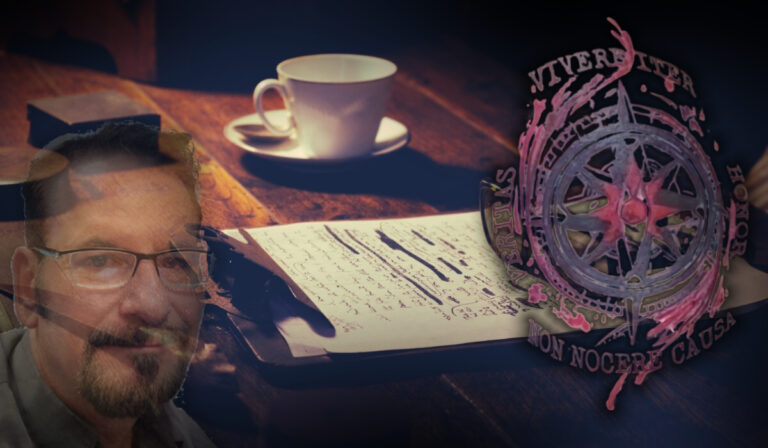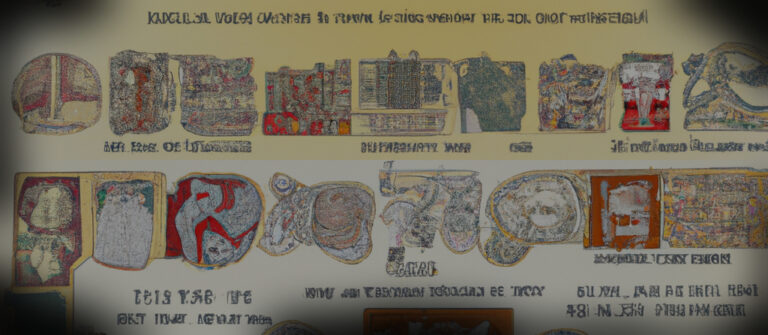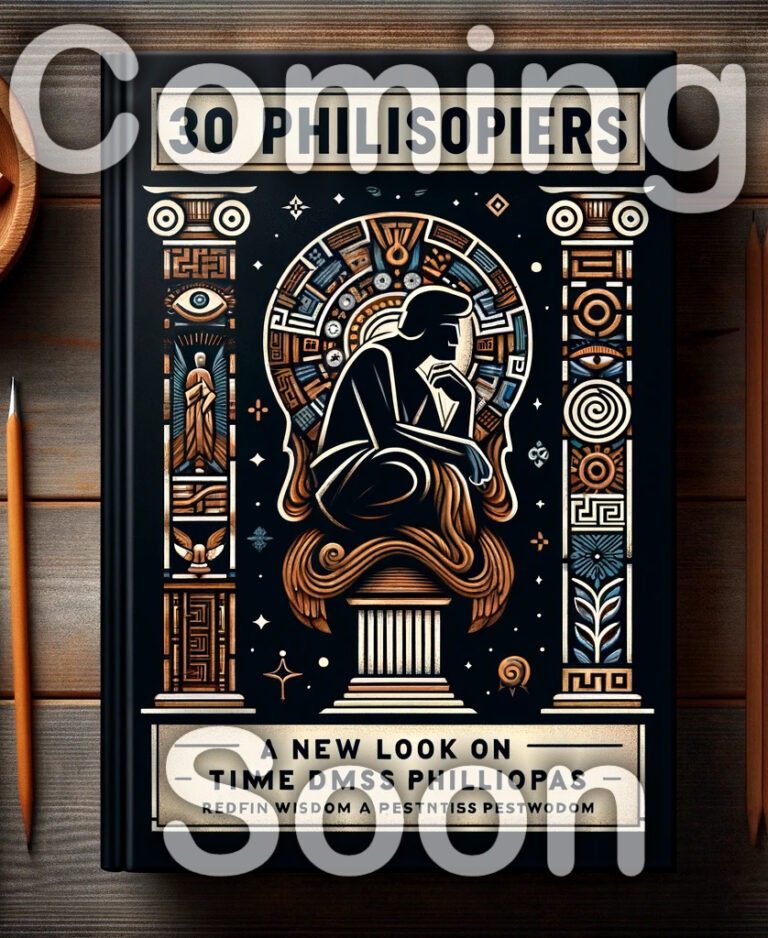At my core, I consider myself a Stoic because of its emphasis on the notion that my thoughts play a crucial role in determining the path of my life. By intentionally guiding the tone and content of my thoughts, I can exercise greater control over my future.
1. My Mantra
As a self-identified Epicurean Stoic with a curiosity for non-religious secular Buddhism, I’ve embraced a personal philosophy that is deeply rooted in reason, rationality, and a commitment to living an ethical life. As an agnostic, I strive to avoid paranormal and supernatural beliefs, and instead focus on exploring the known and the unknown. This approach allows me to better understand the mysteries of life while remaining grounded in reality. I’m not saying I do this perfectly, heck, I’m not even saying I do this well, but I try, and, best of all, I have clear goals to reach for.
My mantra is,
“Enjoy the journey, with truth and honor, causing no harm.”
My mantra serves as the guiding principle in my daily life. This mantra ties together the core tenets of Stoicism, Epicureanism, and Agnosticism, enabling me to find balance and meaning in my existence. In the following I explain how my mantra relates to my personal philosophy and share the virtue and logo anchors that keep me connected to my values. I will also discuss the daily affirmations that serve as reminders of my commitment to truth, honor, and non-harm.

My unique combination of philosophical beliefs – Epicureanism, Stoicism, secular Buddhism, and Agnosticism – emerged from a desire to embrace the joys of life, cultivate common-sense management of life’s challenges, and maintain a healthy skepticism towards new information. By adopting the best aspects of each philosophy, I’ve developed a personal approach to life that is fulfilling and grounded in truth.
Epicureanism encourages me to enjoy life’s pleasures while Stoicism reminds me to appreciate the good things in life and endure the bad with a stoic attitude. Secular Buddhism has taught me the value of disconnecting from negative emotions like hate, anger, and jealousy, while Agnosticism and skepticism provide me with a framework for evaluating new information and forming a well-rounded worldview.

Although some might argue that certain aspects of these philosophies may conflict, I find that they complement each other in my pursuit of a balanced life. For example, Epicureanism’s focus on pleasure-seeking may seem at odds with Stoicism’s call for self-discipline, but I believe that one can enjoy life’s pleasures without sacrificing self-control. Similarly, secular Buddhism’s emphasis on detachment does not conflict with Agnosticism’s skepticism, as both encourage a mindful, rational approach to life.

My mantra and the accompanying affirmations, such as “YOLO! Enjoy the Journey” and “Facts matter. Truth matters,” serve as constant reminders of my commitment to my personal philosophy. They help guide my relationships with others, my understanding of the world around me, and my decision-making process.
 Latin Translation
Latin Translation
In Latin, I translate my mantra to:
“Vivere iter cum veritas et honor, non nocere causa.”
This translates word-for-word to “To live the journey with truth and honor, no harm to the cause.” However, I made some slight changes to the English translation. Instead of using the Latin word for “enjoy,” I used “Vivere” which emphasizes living life to the fullest, in line with the concept of “eudaimonia.” Additionally, “non nocere causa” translates back to “no harm to the cause,” which encompasses a broader meaning than simply “cause no harm.” It encompasses principles of non-violence, self-control, social responsibility, and environmentalism. It stresses the importance of peaceful means to bring about change, avoiding harm to oneself and others, and considering the impact of actions on the community and the environment.
Anchor Virtues and their Logos: An Exploration
This mantra focuses on four anchor virtues. These virtues are inspired by Stoicism and Pagan Epicureanism, and each virtue is represented by a specific logo that symbolizes its essence. Keeping the connection between the virtues, their logos, and the mantra is essential for me and brings a deeper meaning to the mantra and allows me to extend these virtues with affirmations.
- Journey – VIVERE ITER
Pagan Epicureanism focuses on the pursuit of happiness and the enjoyment of life. The anchor virtue “Journey” and the Latin “to live” are reminders to live life to the fullest. The logo associated with this virtue is the Tetrapharmakos, an ancient Greek recipe for living a happy life. The Tetrapharmakos consists of three statements: “Don’t fear God or nature, nor death,” “Seek and enjoy happiness,” and “Endure sadness and pain.” This logo and the associated philosophy highlight the importance of cherishing life’s journey and finding balance in the face of adversity.Pagan Epicureanism, to be clear, is a modern-day interpretation of Epicureanism that emphasizes the spiritual aspects of the philosophy. It incorporates pagan beliefs and practices, such as the worship of nature and the celebration of seasonal festivals, into the Epicurean worldview. I don’t “worship” nature in the sense of praying to nature, but I do look at nature with awe. I also embrace the idea that Pagan Epicureanism sees pleasure as a natural and spiritual part of life, our nature, and seeks to cultivate a deep sense of connection with the natural world as a way to find happiness and fulfillment.
- Truth – VERITAS
Truth, or Veritas, is a cornerstone of Stoicism and represents the virtue of wisdom. I know absolute truth exists, but is elusive. In my personal philosophy, the pursuit of truth is essential to living a fulfilling life. The logo chosen for this virtue is the Owl of Athena, a symbol of wisdom and knowledge in Greek mythology. By associating the virtue of truth with the wise owl, the philosophy emphasizes the importance of seeking and understanding the truth in all aspects of life. - Honor – HONOR
Another Stoic virtue, Honor represents the value of courage in facing life’s challenges. In this philosophy, the Lion is chosen as the logo for Honor, symbolizing strength, bravery, and nobility. Like the lion, one should strive to be courageous and honorable in their actions, upholding their principles and standing up for what is right. Give money to worthy causes. Show up and demonstrate. Don’t stay silent and passive around racism, sexism, and other wrongs. - No Harm – NON NOCERE CAUSA – “No Harm to the Cause”
Finally, the anchor virtues of No Harm encompass the Stoic principles of Temperance and Justice. These virtues encourage individuals to act with moderation and fairness, seeking to cause no harm, or less harm, to others, themselves, and to society. The logos representing these virtues are the Scales of Justice and the symbol of Temperance. The Scales of Justice symbolize the delicate balance required in making just decisions, while the Temperance logo represents the need for moderation and self-control in our actions.
The anchor virtues and their associated logos serve as reminders of the core tenets of my personal philosophy. By incorporating the principles of Stoicism and Pagan Epicureanism, the virtues emphasize the importance of living a balanced life that honors the journey, seeks truth, acts with courage, and causes no harm, or at least less harm.
My Affirmations
Affirmations are positive statements that help me realign my inner voice and prelinguistic thoughts with what I consider a healthier soul. My intent is to overcome self-sabotaging, negative thoughts. By repeating these statements on a semi-regular basis and when needed, I internalize them and adopt a more positive and productive mindset. I adjust my prelinguistic thoughts essentially training my inner voice to go from critic to coach. My personal affirmations are organized into four main categories: Journey, Truth, Honor, and No Harm.
The Journey category encompasses my focus on living a balanced, enjoyable, and fulfilling life. These affirmations remind me to be present, embrace the positive and negative aspects of life, and cultivate a sense of optimism. They also emphasize the importance of humanism, balance, and living in the moment.
- YOLO! Enjoy the Journey.
- Be present for your path. Be Zen.
- Feelings are not reality.
- Embrace the yin & yang. Strive for balance.
- Embrace humanism, reject nihilism.
- Embrace optimism, reject pessimism.
The Truth category centers around the importance of honesty, factual information, and rational thinking in my life. These affirmations encourage me to seek and follow the truth, acknowledge the existence of absolute truth, and embrace the idea that rational individuals are closer to the truth. They also emphasize the importance of challenging dogmatism and admitting and correcting errors when necessary.
- Facts matter. Truth matters.
- Seek and follow truth.
- Absolute truth is elusive, but exists.
- Personal truth lives in one’s reality.
- Closer to truth is good.
- The rational person is closer to the truth.
- When logic and belief collide, logic wins.
- Challenge dogmatism.
- Admit and correct errors.
The Honor category focuses on respecting others, understanding the value of worthiness, and fulfilling my duties to myself, my family, and society. These affirmations serve as reminders to live a life of integrity, seize the day, and get things done in a responsible and conscientious manner.
- Respect everyone.
- Understand what is worthy.
- Honor the worthy.
- Understand the unworthy.
- Duty to self, family, work, friends.
- Duty to state, society.
- Carpe Diem, Get S*** Done (GSD).
The No Harm category emphasizes my commitment to avoiding harm, both to others and myself. These affirmations encourage me to live and let live, strive for fairness, and make better decisions that minimize harm to all involved parties.
- Avoid harming others, as well as yourself.
- Cause no harm when possible.
- Cause the least harm.
- Live and let live.
- Prefer fairness, over favoritism.
- Make better decisions.
While I do not review these affirmations daily, I find that they provide invaluable guidance when life presents challenges. By referring back to them during difficult moments, I am reminded of the core principles and values that underpin my personal philosophy, helping me to navigate life’s obstacles with truth, honor, and a commitment to causing no harm.
2. Epicurean Stoicism
Philosophy reflects human thought and helps us make sense of the world. It can be applied in ethics and moral reasoning. In this book, philosophy and religion are not opposing forces; rather, every religion has a philosophy, and philosophy can also exist independently of religion. There are philosophical ideas and principles that are shared among different religions and philosophical schools of thought, independent of religion. My goal with this book is to focus on philosophy while respecting each belief system and religion. I might mention some religious practices or supernatural beliefs in passing for context, but my goal is always respect.
Your personal philosophy is your individual beliefs, values, and ethics as influenced by your life which hopefully includes reflection of various philosophical traditions. Like language and religion, your personal philosophy is a deeply personal and individual aspect of your life, whether you are aware of it or not. When asked, “what is your philosophy?” Depending on the day, I sometimes answer, “I identify as an Epicurean Stoic embracing Secular Spirituality.” I’m not sure it that’s a flippant reply, or I mean it. Either way, I have developed a personal philosophy that draws from various philosophical traditions. Epicureanism emphasizes the pursuit of pleasure and the avoidance of pain, while Stoicism emphasizes self-discipline and acceptance of fate. Buddhism emphasizes mindfulness, compassion, and the pursuit of inner peace. By combining these different perspectives, I have created a personal philosophy that resonates with me and guides me. My philosophy is captured in my mantra:
“Live the journey, with truth and honor, causing no harm.”
My personal philosophy includes daily meditation and affirmations that help me cultivate mindfulness and inner peace. When people ask me what my philosophy looks like, I often respond with a question of my own: how much time do you have? My philosophy is a complex and multifaceted worldview that is difficult to explain in a few words. But that is precisely what makes personal philosophy so interesting and unique – your personal philosophy was shaped by your environment, your upbringing, and your experiences, and your personal philosophy is just as interesting and unique as mine.
This personal approach also extends to one’s worldview. Everyone has a personal worldview which includes a personal way of speaking, a personal religion, and a personal philosophy. They have these things whether they are aware of it or not.
Your worldview may be shaped by a particular philosophical tradition, such as Stoicism, Christianity, or Buddhism. You might be influenced by many different philosophical traditions and schools of thought, each with their own unique perspective on the world and our place in it. For example, Epicureanism and Stoicism are two distinct philosophical traditions that have different perspectives on the nature of pleasure and the role of fate in our lives. Buddhism, too, has various branches, such as Theravada, Mahayana, and Zen, each with their own unique teachings and practices.
In 1858, Oliver Wendell Holmes expressed the following thought:
“We are all tattooed in our cradles with the beliefs of our tribe; the record may seem superficial, but it is indelible .” — Oliver Wendell Holmes, Sr., 1858
His thought suggests that our beliefs are not chosen by us but rather imprinted on us from birth through the influence of our family, tribe, and community. These beliefs are deeply ingrained and difficult to remove, forming an indelible record that shapes us throughout life. Holmes suggests that our worldviews initially stem from the heavy influence of external factors.
Your personal philosophy does not have to be dogmatic – you can be open to interpretation and reinterpretation. Each of us gets to decide what beliefs and values are important, and how to prioritize those beliefs. Your personal philosophy does not have to be about conforming to a set of predetermined beliefs and ideas. You can cultivate your personal philosophy to resonate with who you are as an individual.
What is an Epicurean Stoic?
The Dialectic Thinking of the Golden Rule: The Middle Way of Yin and Yang
Stoicism and Epicureanism have much in common, but much in conflict too. In my philosophy, I try to reconcile those differences.
I love the title of this section. It combines four related and complementary ideas in philosophy that revolve around the themes of balance and harmony. The Yin and Yang of Taoist philosophy posits that there are opposite yet complementary forces striving for dynamic equilibrium. When balanced properly, the Yin and Yang of these forces harmoniously coexist. Examples of such opposing forces include light-dark, active-passive, and male-female. The Golden Rule, often attributed to Confucius, encourages individuals to treat others as they wish to be treated, promoting a balanced give-and-take between people and organizations. The Middle Way of Buddhism, which shares similarities with Aristotle’s Golden Mean, advocates for a balanced approach to life, avoiding extremes and embracing moderation in order to achieve enlightenment and inner peace. Finally, dialectical thinking emphasizes the conflicts and contradictions between opposing forces and their synthesis into new forms.
The Yin and Yang of Pleasure and Virtue
Finding the right balance between enjoying life and being virtuous can be like balancing Yin and Yang. Epicureanism is about chasing pleasure and happiness, while Stoicism focuses on virtues like wisdom, courage, justice, and self-control. My personal beliefs mix both, enjoying life and being a good person. This balance helps me live a full and meaningful life.
Here are three examples of how I mix these different ideas in my everyday life:
- Enjoying simple things: I like to enjoy good food, time with friends, and beautiful sunsets. This is part of Epicureanism. At the same time, I follow Stoicism by not letting these pleasures control my happiness or decisions.
- Handling emotions: When I face tough situations, I stay calm and balanced like a Stoic. But I still let myself feel happy emotions like joy, love, and gratitude, as Epicureans do.
- Balancing work and fun: I work hard and stay committed, which is part of Stoicism. But I also know it’s important to relax and have fun, which is an Epicurean idea.
By combining ideas from both Epicureanism and Stoicism, I find a balanced way to live a fulfilling and meaningful life.
The Middle Way of Emotions: Balancing Epicureanism and Stoicism
To handle emotions well, we can follow the Middle Way, which combines ideas from Epicureanism and Stoicism. Even though they’re different, we can find balance between them. Epicureanism teaches us to be calm and avoid pain, while Stoicism helps us be strong and balanced, no matter what happens. By using both ideas, we can handle emotions better and deal with life’s challenges. Here are three examples of how I mix these ideas in handling my emotions:
- Staying calm and strong: I try to be calm and avoid pain, like an Epicurean, but I also work on being strong and balanced inside, like a Stoic. This helps me feel peaceful even when things go wrong.
- Dealing with tough times: When I face problems, I use Stoic ideas to stay calm and know that I can only control my reactions. At the same time, I remember that it’s natural to want to feel better, like an Epicurean.
- Enjoying life and being grateful: I enjoy life’s good moments, like time with family or being in nature, as an Epicurean would. But I also think like a Stoic, knowing that my happiness doesn’t just come from these things. I’m grateful for what I have and stay balanced.
By using ideas from both Epicureanism and Stoicism, I find a balanced way to handle my emotions, be strong, and enjoy life.
The Dialectic Thinking of Fate and Divine Providence: Balancing Stoic Acceptance with Epicurean Agency
The role of fate and personal control in our lives presents a conflict between Stoicism and Epicureanism, calling for dialectic thinking to reconcile these opposing perspectives. Stoicism believes that the universe is governed by fate, and we should accept our place in it. Epicureanism, on the other hand, says that we should take control of our own lives, without relying on divine intervention. These two ideas conflict because they represent different beliefs about the universe and our ability to influence our lives.
To balance these opposing forces, I take on personal responsibility while accepting the flow of nature. For example, when someone tries to convince me that astrology is real, I engage with them to challenge their belief. When they refuse to change their mind, which often happens, I accept the flow of the universe. I understand that they have just as much right to follow their gut as I do to follow logic and reason.
My philosophy leans more toward the Epicurean perspective, emphasizing personal agency and responsibility. For example, I might take a proactive approach to personal growth and self-improvement, setting goals and working diligently to achieve them, in line with Epicurean principles of self-determination.
At the same time, I recognize that some aspects of life are beyond my control. In these instances, I draw upon Stoic principles of acceptance and resilience to navigate challenging circumstances. By using dialectic thinking, I balance the seemingly contradictory ideas of Stoicism and Epicureanism, forging a cohesive personal philosophy that acknowledges the interplay of fate and personal agency in shaping our lives.
The Golden Rule of Social Engagement and Duty: Balancing Personal and Communal Interests
The importance of social engagement and duty can be seen as a balancing act between Stoicism and Epicureanism, reflecting the principles of the Golden Rule. These two concepts are in conflict because Stoicism advocates for fulfilling one’s social obligations and duties, emphasizing the interconnectedness of society, while Epicureanism promotes a more individualistic approach to life, focused on personal happiness and well-being.
My philosophy strives to strike a balance between the two, valuing personal happiness while also recognizing the importance of duty and responsibility to others. In doing so, I aim to treat others as I would like to be treated, honoring the Golden Rule. For example, I might choose to volunteer my time to help others in need, fulfilling my Stoic duty to society while also deriving a sense of personal satisfaction and happiness from making a difference in the lives of others. On the other hand, I might take time to relax and pursue my hobbies, ensuring that I maintain my personal well-being and happiness in accordance with Epicurean principles. This balance enables me to maintain my own well-being and pursue personal goals, while also contributing positively to the lives of those around me, fostering healthy relationships, and promoting the greater good.
The Golden Mean of Views on the Gods and the Afterlife: Balancing Epicurean Skepticism with Stoic Divinity
In considering views on the gods and the afterlife, we encounter another point of tension between Epicureanism and Stoicism, which calls for an application of Aristotle’s Golden Mean to strike a balance between these divergent beliefs. Epicureanism contends that the gods are distant and uninvolved in human affairs, and there is no afterlife. Stoicism acknowledges the existence of divine beings and their role in shaping human destiny, but their views on the afterlife are less clear.
My agnostic perspective leans more towards the Epicurean view, embracing a rational and skeptical approach to the supernatural. However, this does not mean that I completely dismiss the Stoic view of divine beings. Instead, I see them as metaphorical representation of nature more inline with Spinoza’s God is nature, nature is God. Things have a nature. A lion hunts and kills. An elephant eats grass and will trample lions attempting to eat their calves. There is also a natural order to things; things like animals, planets, and even houses are born, exist, and die. By adopting Aristotle’s Golden Mean, I strive to balance the Epicurean skepticism with an appreciation for the Stoic recognition of divine, and in my book natural, influence, while maintaining a focus on rationality and inquiry.
My favorite Stoic philosopher is Marcus Aurelius, who often expressed uncertainty about the existence of gods in his writings. Phrases like ‘if the gods exist’ resonate with my agnostic perspective, leading me to view Marcus Aurelius as a somewhat agnostic thinker. While I recognize that this interpretation might not align with every aspect of Stoicism or be the most widely accepted view, it demonstrates how personal philosophies, including mine, can be shaped by engaging with and adapting the ideas of influential thinkers.
Conclusion
For those interested in exploring a similar path, I recommend starting with skepticism as a foundation for critical thinking and evaluation of new information. From there, delve into Stoicism for its practical approach to life, followed by Epicureanism for its focus on enjoyment and happiness. Lastly, explore secular Buddhism for its teachings on detachment and mindfulness, and Agnosticism as a form of skepticism towards the unknown.
For me, Stoicism resonates most strongly because of its central tenet that my thoughts have the power to shape my destiny. By carefully curating my thoughts and perspectives, I can chart a course that aligns with my values and goals, and be better prepared to handle whatever challenges come my way.
My personal philosophy, rooted in Epicureanism, Stoicism, secular Buddhism, and Agnosticism, has allowed me to develop a fulfilling and meaningful approach to life. By embracing the best aspects of each philosophy and incorporating them into my daily mantra and affirmations, I’ve found a unique balance that guides my actions and decisions, keeping me grounded in truth, honor, and non-harm.
![]()
For a vocabulary-based view of my philosophy, read My Philosophy Definitions.
![]()
Q: Why do you identify as agnostic rather than an atheist?
A: It’s easier for me. For most people I speak with, the term “atheist” carries heavy Christian connotations. They may assume that I’m a God-hater and believe that God is evil, but that’s not me. While there are atheists who fit that description, my definition is simply that I don’t believe in God. Just like I don’t believe in unicorns, I don’t believe in God. However, I’m open to evidence that may prove otherwise. It would be fascinating to live in a world with unicorns and gods. So far, the evidence presented to me for the existence of God is about as convincing as the evidence for unicorns. In my life, I’m very curious about the truth, and I strive to believe only in rational things. I reject belief systems such as astrology, numerology, and Christianity, and I do not believe in supernatural things like gods, ghosts, or unicorns.














